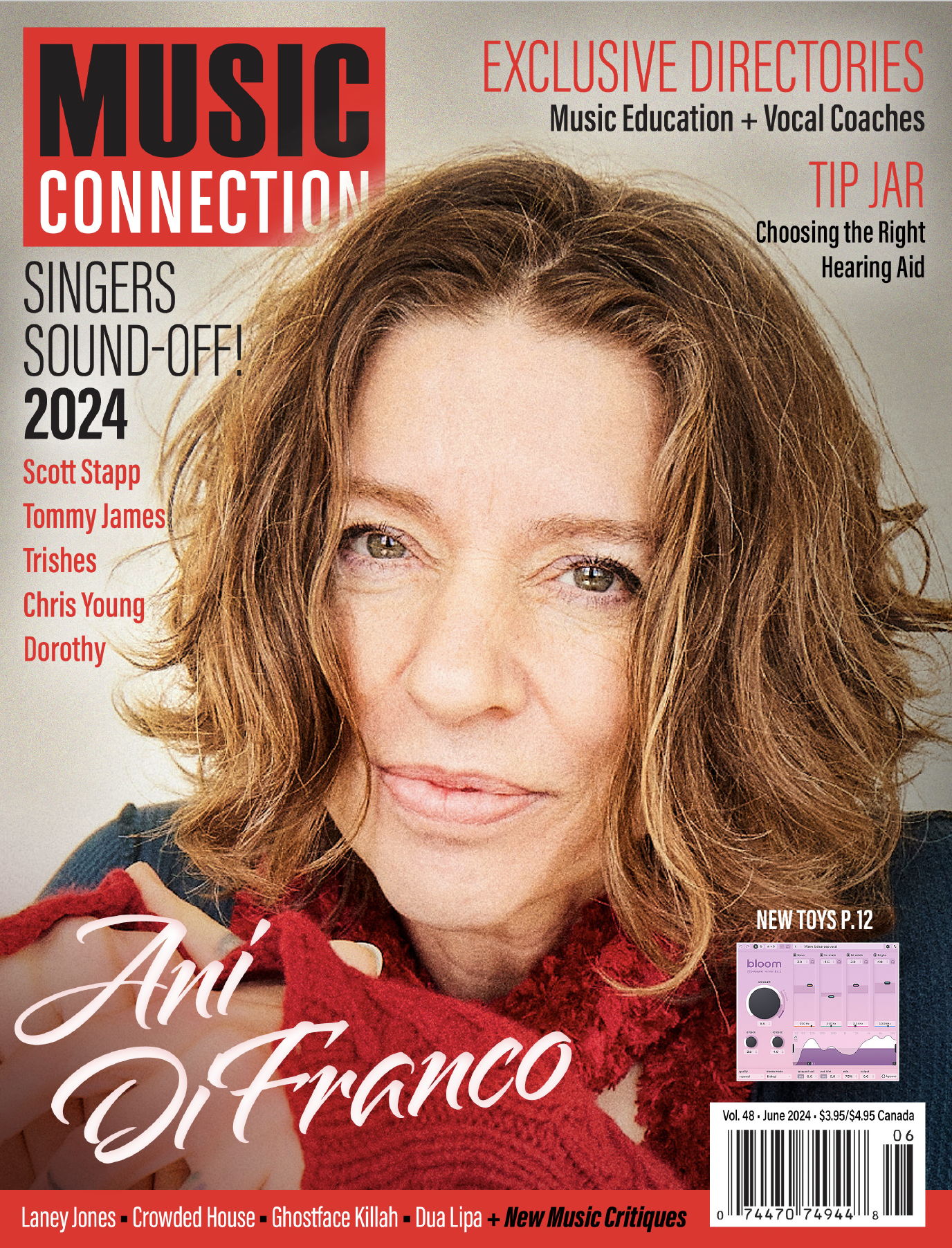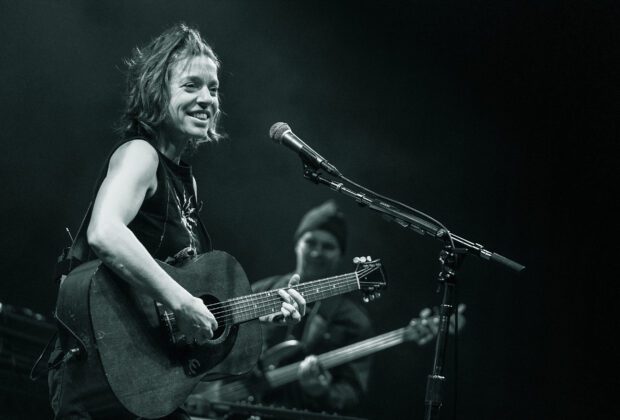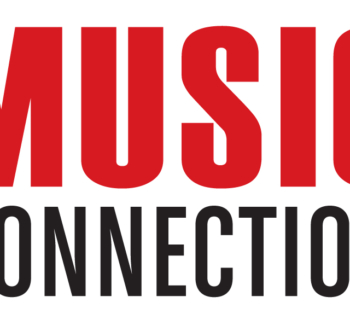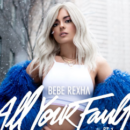Over a span of 22 full-length releases, the uncompromising artistry of activist, songwriter, and performer Ani DiFranco has always spoken to a creed of inclusion, autonomy, and freedom. The fiercely independent artist, who famously founded her own imprint, Righteous Babe Records in 1990, now delivers her 23rd collection, the trenchantly titled Unprecedented Sh!t.
The compendium of 11 new songs presents a companion soundtrack for the chaotic context of 2024: the first-ever criminal trial of a former U.S. president, the threats to women’s rights to control their bodies, unchecked corporate greed, and the brutal decimation of our planet’s air, water, and land.
Like the topical ‘60s folk singers who have inspired her, DiFranco uses songs to drive change. As her latest repertoire continues to speak to unspeakable times, her emphatic voice and furious guitar technique are framed in inventive arrangements and productions, courtesy of producer BJ Burton.
Referring to DiFranco as an over-achiever is an understatement. In addition to her recording career, she authored No Walls and the Recurring Dream, a New York Times best-selling autobiography, and her first children’s book, The Knowing, to be followed this year by a second children’s title, Show Up and Vote.
In her life, her art, and her role as an of advocate for social justice, DiFranco narrows a widescreen view with a razor-sharp perspective, and pulls no punches in sharing her pointed observations—both in songs and in this conversation. For this exclusive cover story, MC caught up with the artist in New York City, where she is currently performing her Broadway debut as Persephone in the Tony and Grammy award winning Best Musical Hadestown.
Music Connection: We begin by noting that your latest release—all 11 songs and 35 minutes of it—is your 23rd release.
Ani DiFranco: Really! Who knew I would live this long?
MC: Were the songs specifically written as a collection, or were they preexistent?
ADF: These songs came about in a myriad of ways. Some of them are more just typical songs that I write on the road, out there in the world. Living, and feeling, reacting to my life and my society. Other songs were created with specific purposes; like a theatrical play that never came to be, and a children’s book that I was asked to write and found out that I couldn’t write without my guitar in hand.
So, I wrote a song, and turned it into a book. These songs have different motivations. It’s my life for the last year or two, like any album is, really.
MC: The title of the album, Unprecedented Sh!t, speaks to these treacherous times. It addresses the political climate, the environmental crisis, and of course to all manner of personal challenges and changes, divestment of emotional baggage, and the foundation of your identity that defies easy categorization of sexuality.
ADF: I felt like it had various meanings. When I arrive on any album title, it’s for that reason. It resonates for me on different levels. It speaks to our political moment. And “political” is paraphrasing: any political, environmental, everything moment. We stand on the precipice of many things.
Also, I felt like sonically this album is a departure, because of my collaboration with BJ Burton, I felt the title spoke to the album itself—just the sound of it in relation to my canon.
MC: The narrative thread is evident with the order of songs. While we exist in an era of singles, this collection is cohesive and intentional, rich with ideas and impressions. How did you arrive at this specific sequence of songs?
ADF: Painstakingly. Album sequence is an unexpectedly complicated thing for me. For that matter, even a show set list is like a daily version of that. It’s like it is somehow more important than it should be, the order that things come in life. Timing is everything, and flow is important.
I always start out with an idea of song order for an album, and it always changes. I have to start thinking about it early on and give myself enough time to notice my fatal flaws in thinking. BJ weighed in at some point too.
MC: You have mentioned that being asked about specific songs—who or what they are about—is insulting and limiting, comparing you as a songwriter to a court stenographer. That said, “Spinning Room” which opens the album, serves as a prelude of intimacy. It’s very conversational.
ADF: I get that. Songs mean what they mean to whoever is listening to them. For me as the writer, “Spinning Room” is a song that’s sung by the earth itself, from the voice of the planet, and from one molecule of the planet, which is a human being. It sets up the journey of the album with “How could I be well when nothing is well?”
We humans can’t be well when we are suffocating the earth beneath our feet and the sky above us. We are very much unwell, so it is going to manifest in our personal lives, not just on some meteorologist’s map. [Humans] are one body with the earth, and we can’t poison our mother and be OK.
Not to be too dark about it, but all of the things on the record happen. I chose this song to go first, because it’s kind of the macro view of “Why do I struggle so?” Well, look around me. How could I not? How could I just be OK?
MC: Speaking of unwell, we have “Virus” with the line, “I was so deeply pleased to pause this life.” You have recorded and toured non-stop since your recorded debut. We know you prefer the role of activist, but it is undeniable that you are also immersed in the business of running an independent record label.
Since you are a wife and a mother, your responsibilities are personal as well as professional. That said, how did you endure creatively through the pandemic?
ADF: I took the bra off like millions of other women. Hair, hair, everywhere! For my song order logic, “Virus” flows off of “Spinning Room,” because once again it talks about the relationship between homosapiens and all other consciousness, and all other life on earth. The premise of that song is, “We are also a virus.” Look at how we operate. It’s the pot calling the kettle black, so here is a taste of your medicine. Humans, listen up.
MC: Some artistic creators have shared that they utilized the isolation positively and productively.
ADF: I was personally quite relieved to be told to stay home and shut up. That really was my heart’s desire. And so was true of all nature. For humans to sit down and shut up for a moment was a great relief, a lessening of the strain of global warming, and environmental exploitation, and pollution and destruction.
In my cells I could feel the sigh of relief that was much bigger than my own body. So many lessons available to us there, in that very traumatic event—like any traumatic event. And many prayers I’ve sent that we hear them, and heed them and collectively rise to the occasion.
MC: You have employed the services of a producer for the new project, BJ Burton, recognized for his work with Bon Iver, Low, Charli XCX, and other artists. How did you map a collaborative process?
ADF: The secret fact of this record is that all the weird sounds: the keyboards, the cellos, the this and that: it’s all my guitar manipulated in the hands of BJ. The process was crazy. I would record the songs in my home studio, often just me and my guitar. Sometimes I played keyboards, did some percussive things, sang a harmony, but it was often just voice and guitar.
MC: What are the instruments that we are hearing within the orchestration on “Virus” that sound like a sampled cello and a djembe drum?
ADF: On “Virus” I sent BJ just a simple basic track. And with these elements that I sent him—just my voice and guitar—he filtered, manipulated, sampled, and looped with all of these crazy gizmos. He put my little track in a spaceship, flew it to Pluto and back, and created soundscapes out of some very elemental tracks.
MC: How was the percussion configured?
ADF: Some of the percussion was me playing on my guitar. But BJ also sampled my song, the percussion outro, from “32 Flavors” that I released in 1997. He wanted more percussion, so he went and analyzed my own shit. “What do we have copyright on?”
So that’s why I also listed my drummer, Andy Stochansky in the credits of the album, because he’s in there playing a hand drum from 25 years earlier. I just thought it was only fair to credit him for this sample of him playing from so many years ago.
MC: “More or Less Free” is a folk song with the lines, “I see these people around with badges…” A badge represents an identity, generally that of an overlord or an oppressor.
ADF: That’s what the songwriter meant. Cops, prison guards, the authority of American black and white power system. It says that some people’s crimes are unforgivable, and others’ crimes are not. Some people get the benefit of the doubt, and some people never do.
And all people are fallible, and fragile in their core good. It’s the luck of the draw, in a lot of senses, where we end up and how much mercy we’re shown. It’s a song about America in some ways.
MC: You have a deep history of advocacy and support, with performances at countless benefit concerts, donating songs to many charity albums, and contributing time and energy to a dizzying list of progressive causes. Now, in 2024, it would seem to be a great time to be an activist.
ADF: Yeah! There has never been a better time. Or else. I just keep praying that the more extreme it gets, the more possibility for awakening of a critical mass of people. You just gotta wonder—is this not clear? Is this not a time to turn this shit around?
MC: These themes relate to two songs, “New Bible,” and “Baby Roe” with its image of “the pulsing polarity of vision.” As you sing: “There’s just too many distractions/too many coming attractions/too many screens fiercely flashing/their subliminal frame/it’s no wonder we all just go along.”
ADF: It’s my way of speaking to my crazy idea that patriarchy is the first wrong turn. When our society is based on half of humanity’s nature, there’s not balance and interplay. That pull that must happen between genders for that balance to be struck, for that universe of possibility to open up before us.
MC: “Boots of a Soldier” made us reach for the dictionary. “All the stories you’ll never know in your tiny little umwelt…”
ADF: Yes! You’re making my day! This is my fondest hope. Go find out what that word means, because I recently did, and it’s fucking profound, man. I read this book called An Immense World by Ed Yong. It opened, in detail, this idea of an “umwelt,” this universe that an individual form of life exists in.
Of course, as humans, we project ourselves onto everything all the time. We assume that our world is the world. Meanwhile to our right and to our left, and all kinds of worlds that are equally legitimate, and equally vivid, and equally real.

MC: “You Forgot to Speak” reminds us of a Native American Peyote Chant.
ADF: I love discovering threads of humanness that we share across cultures. That whistling synth is a whole new keyboard that is all rubbery. My husband, who is a gear nerd, got it for me. It became one of the tools for the album. Turn that fucker up. On this track, BJ choked my guitar way down—there is little evidence of it.
MC: The concluding track is “The Knowing.” While we might think of your voice as emphatic, on this song it is more soothing and melodious.
ADF: I’m singing to a child in that song.
MC: On the Righteous Babe Records website you offer this quote: “We are all born many times, into many bodies, and life is much longer than the ego would have us believe. It is infinite, in fact.” Do you believe in reincarnation?
ADF: The longer I live the clearer it is to me that there are levels of understanding that Christianity, which is the culture that I was raised in, has yet to reach. But human beings all over the world understand very clearly. I’m very into near death experiences—people who leave their bodies, and then come back to the same bodies—they die and return.
They have all kinds of stories to tell about the process. Our experience of living in this body right now can be deceiving. We think that we are separate, but we are something much more complicated, unified, and glorious than that.
MC: We note that you met the late music historian Alan Lomax backstage at a Bob Dylan concert. You laud his cultural contributions in your book with this description, “Without Alan Lomax, much of what we know and have access to would have simply been lost to us.”
ADF: America is a relatively young country, and people like Alan Lomax did a lot to help us understand ourselves, and know our own culture, and the diversity of it, which is our glory. And respect that all of this art that doesn’t come from privileged white men. There is so much out there that is happening, and his historic recordings really shined a light on it and shared it.
MC: You have profound connections to other older mentors, specifically to legendary figures like the late Pete Seeger and Utah Phillips.
ADF: I always felt a genuine gratitude and respect for my teachers. It started as a kid. I had certain teachers who came into my life who were extremely important in me becoming myself. And it’s been in that sense of “Why didn’t you sign a record deal when you were young and offered the pie in the sky?” Because I looked over there, and I didn’t see any of my teachers.
They were over here, in overalls, and it was Pete, and Utah. And I had this sense of “You are my teachers. Let me follow you.” That’s what I have done and as a lot of humans have done. You figure out who your teachers are, and you follow them. That’s how you enter yourself and your purpose.
Contact Karen Wiessen, All Eyes Media, [email protected]
Ani DiFranco Quick Facts
• Born in Buffalo, NY, DiFranco was an emancipated minor at age 15. In 1990, she relocated to New York City where she performed music and studied poetry at the New School. She was in Manhattan on 9/11 and penned a poem, “Self Evident,” about the historic event. Her poetry has been featured in anthologies, and she was showcased as a poet on the HBO series Def Poetry.
• Building on a DIY concept she developed of distributing hand-labeled cassette tapes at gigs, DiFranco founded Righteous Babe Records at age 19. Since releasing her self-titled debut, the company has been home to artists including Andrew Bird, Arto Lindsay, Nona Hendryx, and Toshi Reagon among many others.
• ‘Til We Outnumber ‘Em, A Righteous Babe release, featured DiFranco and artists including Bruce Springsteen, Billy Bragg, Ramblin’ Jack Elliott, Arlo Guthrie, Indigo Girls, Tim Robbins, and David Pirner with the songs, stories, and poetry of Woody Guthrie performed live by an all-star cast. All profits from release were earmarked to benefit the Woody Guthrie archives and the Rock and Roll Hall of Fame and Museum’s Educational Foundation.
• Her collaborators have ranged from legendary R&B saxophonist Maceo Parker to Cyril and Ivan Neville, and Prince. She toured with Bob Dylan, opening shows for the inscrutable bard.
• In 2024, DiFranco assumed the role of Persephone in the Tony and Grammy-award-winning Broadway musical Hadestown. She has a long history with the show, having sung the part on the original recordings of what was initially a concept album by composer Anaïs Mitchell, a collection released on Righteous Babe.
• While DiFranco is often categorized as a folk artist, her music incorporates a broad spectrum of styles, including jazz, punk, poetry, and blues. As her primary influences, she notes, “My whole life had come down to Curtis Mayfield and James Brown. The Staples Singers, Stevie Wonder, and the Meters. Miles Davis and Alice Coltrane (John’s equally celestial other half). Betty Carter and Ray Charles. Monk.”
• DiFranco claims that she no longer reads press or articles about her, as she writes, “I thought about how much misinformation had already come out about me in the press. I am the one thing that I can absolutely verify in this world and I can tell you, there is a lot of BS that passes for news! I’m not even talking about the overt fact-jacking of Fox News, either, I’m talking about sincere ‘objective’ reporting.” She also disdains the term, “eponymous.”
• Ani has been the recipient of multiple honors and awards, including a Grammy for best album package (Evolve), the Woman of Courage Award from the National Organization for Women, the Gay/Lesbian American Music Award for Female Artist of the Year, the Outmusic Award for LGBTQ+ musicians, the John Lennon Real Love Award, given to artists dedicated to uplifting society through charitable work and social activism, and the Woody Guthrie Award.
• A new documentary on DiFranco’s rise entitled 1-800-ON-HER-OWN will premiere at the Tribeca Film Festival in June. The film is a vulnerable look at her life today, as she struggles to balance artistry with the demands of family.
• While she claims to not be a “gear geek,” DiFranco is a dynamic guitarist who adapts the guitar as a percussion instrument. She has a long relationship with Alvarez guitars. The Alvarez Yairi ADY1 Ani DiFranco signature guitar has an extra-deep mahogany body with a Canadian cedar top and Alvarez System 600T MKII electronics.
A gold-colored top is complimented by a gray pickguard suited to DiFranco’s aggressive playing technique. She also plays a Kay with DeArmond gold-foil pickups and rubber bridge, and a Kay parlor guitar with a rubber bridge as well as various tenor and baritone guitars, and a 1930s Gibson-made Cromwell G-4 archtop.
• Her autobiographical memoir No Walls and the Recurring Dream was a New York Times Top 10 best seller in 2019, and her debut children’s book The Knowing was publishing in 2023. A second children’s book, Show Up and Vote will be released on August 27th.
Photos by Danny Clinch and Asbury Lanes














